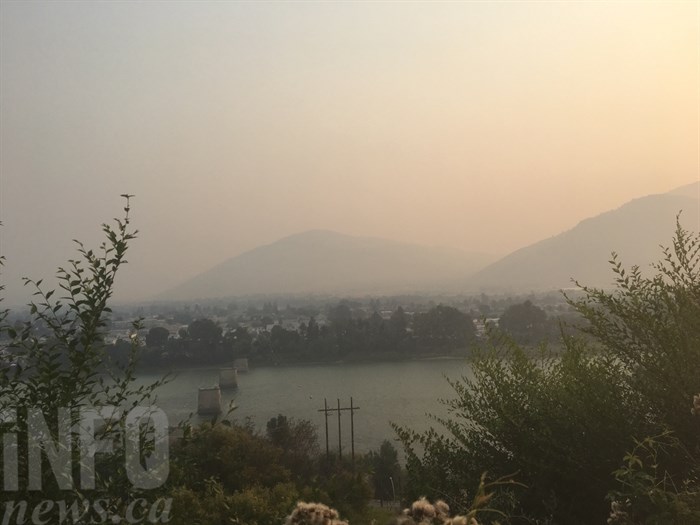
Smoke from wildfires obscures the sun in Kamloops on August 7, 2017.
(ASHLEY LEGASSIC / iNFOnews.ca)
October 19, 2017 - 10:11 AM
KAMLOOPS - The thick wildfire smoke that blanketed Kamloops this past summer had a major impact on the healthy lifestyles of Kamloops residents according to a study by the Kamloops Physicians for a Healthy Environment Society.
Society spokesperson Dr. Jill Calder says they were concerned provincial and regional health authorities were not using this summer as an opportunity to study the impacts of poor air quality, so they decided to find some answers for themselves.
"We were noticing even problems in service delivery and being able to serve the evacuees," she says. "So we took it upon ourselves to do a survey monkey which is a way of quickly getting out information and collating it in terms of studying a population and doing it in real time."
The survey had nine question areas and received 641 responses, an amount Calder says is surprisingly high for a survey like this. Question areas included impacts on lifestyle, symptoms, and what people did to protect themselves.
"We found the wildfire smoke of this past summer really did impact the health and healthy lifestyles of the Kamloops region and we call it significant," she says.
The study found a majority of respondents — 54.4 per cent — had to change their lifestyle because of the smoke. In contrast, only 15 people or 2.3 per cent of those who took the survey felt their lifestyle was not impacted.
In terms of symptoms, the survey found people weren't just suffering from respiratory issues.
The report says symptoms were extensive, with the most common being eye and throat irritation, headache and irritability, along with fatigue and malaise. People surveyed also said the smoke gave them a cough, phlegm, asthma and nose irritation.
A smaller number of respondents said the smoke made them feel anxious, disrupted their sleep and upset their stomach to the point of nausea.
The good news for Calder and her fellow doctors is they found a high rate of people taking precautions to protect themselves from the fine particulate matter carried by the smoke.
Over 97 per cent of respondents took some protective measures, the report says, which included increased furnace air blower filter exchanges, mild lifestyle adjustments, increased use of medications, N95 masks or equivalents, air purifier units and less specialized masks.
Only 2.5 per cent of those who took the survey reported no symptoms from the smoke.
Other question areas like impacts on work or outdoor activities all found a majority of respondents had to alter their lifestyle to make it through the summer.
The survey also allowed for respondents to say what they would like to see done in the future when Kamloops is blanketed by smoke. Roughly two-thirds or 369 survey takers stated they believe the provincial government needs to review wildfire strategies and wanted more understandable data in “real time” for air quality alerts.
About half of the respondents agreed there should be an active air shed management program for the region and there should be collaboration between public and private sectors for monitoring air quality, the survey says.
Dr. Calder says the report has been sent Ministry of Environment as well the public health officers at the Interior Health Authority in an effort to convince them to better prepare Kamloops for another summer of smoke.
"We were concerned especially where the air quality health index was lagging behind on informing us around the quality of our air," she says. "There were multiple times throughout the summer when the air quality health index was simply not the tool required for this job of informing the public so they could protect themselves."
In the report's conclusion the doctors admit the results of their survey and study are far from unexpected, but point out now that their predictions have been proven and quantified, the necessary health authorities can take action to lessen the impact of future air pollution events.
You can read the Kamloops Physicians for a Healthy Environment Society report online here.
Find past stories on the wildfires in B.C. this past summer here.
To contact a reporter for this story, email Mike McDonald or call 250-819-3723 or email the editor. You can also submit photos, videos or news tips to the newsroom and be entered to win a monthly prize draw.
We welcome your comments and opinions on our stories but play nice. We won't censor or delete comments unless they contain off-topic statements or links, unnecessary vulgarity, false facts, spam or obviously fake profiles. If you have any concerns about what you see in comments, email the editor in the link above.
News from © iNFOnews, 2017